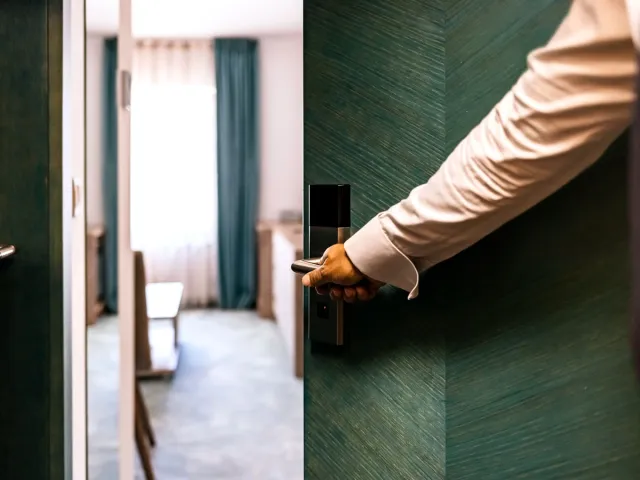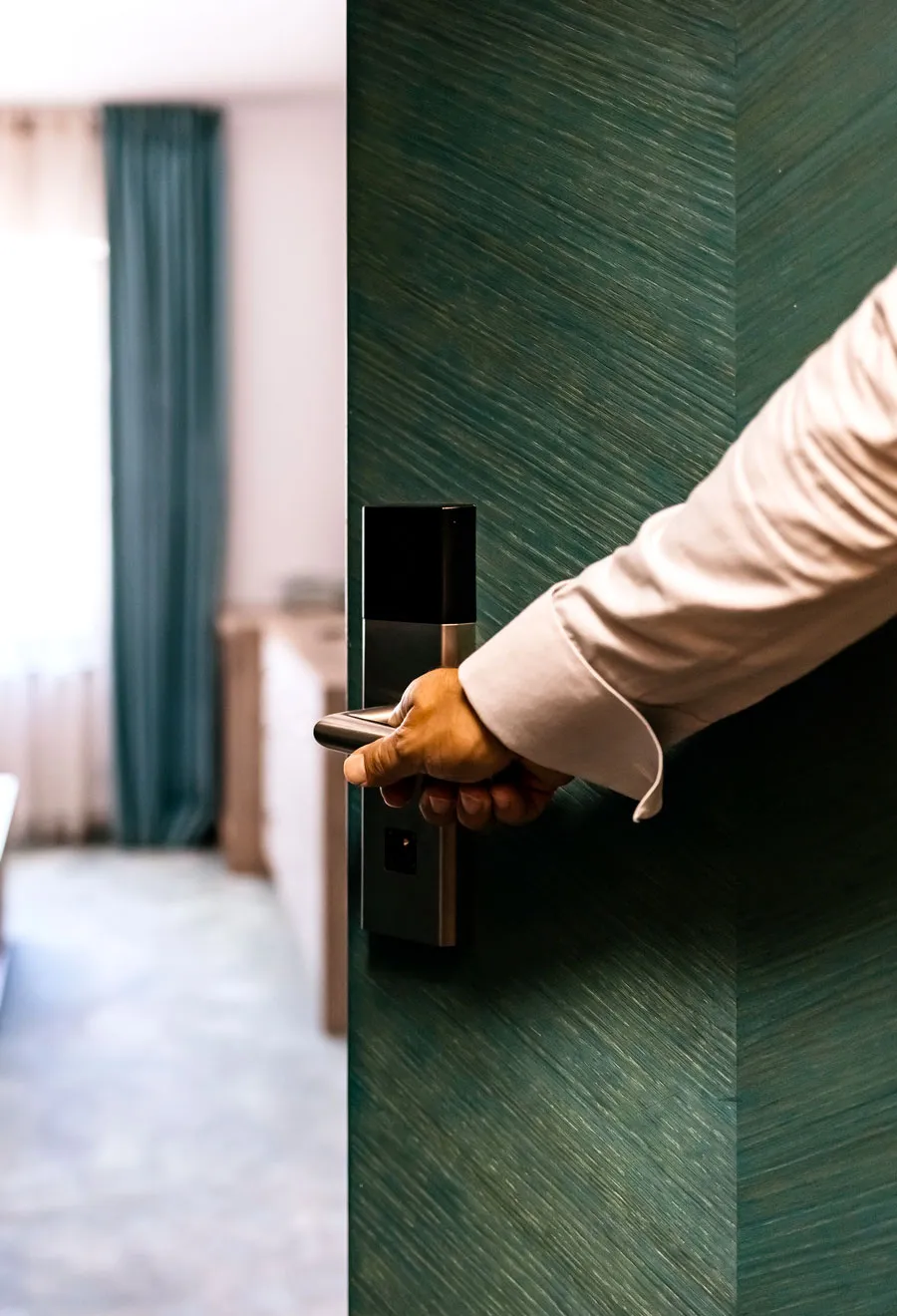How many of us have held our breath while opening the door to a hotel room for the first time? What awaits us on the other side can either delight us or disappoint us, setting the tone for the rest of our vacation. You might think that hotel rooms are randomly assigned, but this isn’t always the case. A mix of technology, loyalty programs, human judgment, and guest profiles determines who gets that coveted ocean-view suite — and who ends up with a view of the parking lot. So, what factors really influence your hotel room assignment, and what can you do to hopefully get a better room? Let’s find out below.
The Power of a Property Management System

Assigning rooms is no easy feat. It can take hotel staff hours to consider many factors, including arrival and departure times, special requests, length of stay, the room category each guest has booked, which rooms have been cleaned by housekeeping at the time the guest checks in, and any maintenance issues with specific rooms. To speed up this process, many hotels use an automated program known as a Property Management System (PMS). These systems automate room assignments, process payments, and integrate third-party booking channels.
However, not every hotel uses a PMS. Jessica Vanel, a former hotel employee who has worked at major hotel chains as well as a boutique hotel, explains in a YouTube video, “At the smaller boutique hotel, it was actually up to the front desk agents to assign the rooms themselves.” Vanel describes how the morning agent was responsible for reviewing the check-ins for that day, looking for any requests or comments, and considering the guests’ membership statuses before assigning rooms in order of priority, from the highest tier to the lowest.
Interestingly, most larger hotels consider membership status before all else when assigning rooms. The two largest hotel chains in the world, Marriott and Hilton, have set industry standards for room upgrades by following a standardized set of protocols. Let’s explore how they dish out the best rooms.
Loyalty Program Membership Is Important

When staying at a hotel that is affiliated with a larger chain, such as Hyatt or IHG, the most crucial factor in getting a “good” room is member status. Membership programs are free to join, but top-tier members — those who stay the most nights at a particular hotel brand each year — typically get better rooms. This system encourages guests to remain loyal to one brand.
Marriott has six membership tiers, ranging from Member (for those who stay nine nights or fewer a year) to Ambassador Elite (loyal members who stay 100 nights or more and spend more than $23,000 annually). The highest four tiers — Gold, Platinum, Titanium, and Ambassador — are eligible for complimentary room upgrades upon arrival, subject to availability. This means that if a better room becomes available, you may be automatically upgraded. You can also politely inquire about an upgrade at check-in.
Still, even the lower membership tiers — Member and Silver — have a better chance of receiving a “good” room compared to nonmembers. This is because hotel staff can view guest profiles and consider specific requests, such as preferences for floor levels or proximity to amenities. Additionally, hotel staff see these guests as potential repeat customers, increasing the likelihood of enticing them to return.
Hilton’s room selection process works similarly. This brand offers four membership tiers — Member, Silver, Gold, and Diamond — with space-available upgrades for the highest two tiers at check-in.
Do Non-Elite Members Get Benefits?

It’s worth noting that lower-tier members at hotel chains like Marriott and Hilton do not regularly receive complimentary upgrade benefits. However, they can still make room requests in advance through their online member profile, which may result in a better room assignment. If you have preferences or perhaps are celebrating a special occasion, be sure to communicate that during the booking process or by calling the front desk before you arrive.
Although hotels with membership programs prioritize their elite members for preferred room assignments, any member — regardless of status — has a higher chance of receiving a better room compared to nonmembers. This is why it’s always worthwhile to sign up for free membership programs before booking your stay. In smaller hotels that do not have a membership program, room assignments and requests are typically managed by hotel staff, who will consider requests based on availability.
Don’t Want Last Pick? Do This One Thing

Typically, guests who book through a third-party system get the less sought-after rooms. That’s because when you book through a third-party such as Expedia or Booking.com, the hotel staff sees minimal information about you, including any specific preferences you may have, and these bookings are typically less profitable for the hotel because they have to pay a commission to the third-party site.
Third-party bookings are typically passed to the “auto-assign” feature on the PMS, meaning they’re the leftovers that the computer system randomly assigns because they do not have elite status or any other preferences that require attention from hotel staff. This means that your chances of getting a “good” room are generally based on luck (or how full the hotel is that day).
Hilton, for instance, explains that guests are more than welcome to book through any reputable third-party website, but these guests will not receive Hilton Honors points, stay or night credits, or any additional Hilton Honors member benefits. Similarly, Marriott classifies third-party bookings as a “Non-Qualifying Rate,” so members will not receive points or other benefits for those stays. To receive your member benefits and potentially secure a better room, it’s always recommended to book directly through the hotel’s website.
Marriott Rolls Out AI Room Assignments

For years, hotels have combined staff input and property management systems to generate room assignments, but new technology may soon change the status quo. Marriott is piloting an AI program to streamline room assignments. The company says that the goal is not to replace staffers, but to reduce the workload of hotel staff, allowing for more guest interaction and reducing tedious backend tasks.
Naveen Manga, global chief technology officer for Marriott International, explains that the new program is “essentially, taking hours and hours of manual work — all that heads-down work the associates do — and in a fraction of a second, 1.2 million rooms can be assigned.”
The program is still in its pilot phase, but some guests may already notice a difference. The new AI system aims to make upgrades easier and automatically available for elite members when there are open rooms. Previously, those members had to contact the hotel to request upgrades.
Even with new technology on the horizon, the key takeaway remains that to get a “good” hotel room, first, you should always book directly with the hotel using your loyalty member number, rather than a third-party platform. Additionally, be sure to complete your online guest profile and preferences and reach out to the hotel the morning of your check-in to communicate any special requests.
More from our network
Daily Passport is part of Inbox Studio, which publishes content that uplifts, informs, and inspires.
















